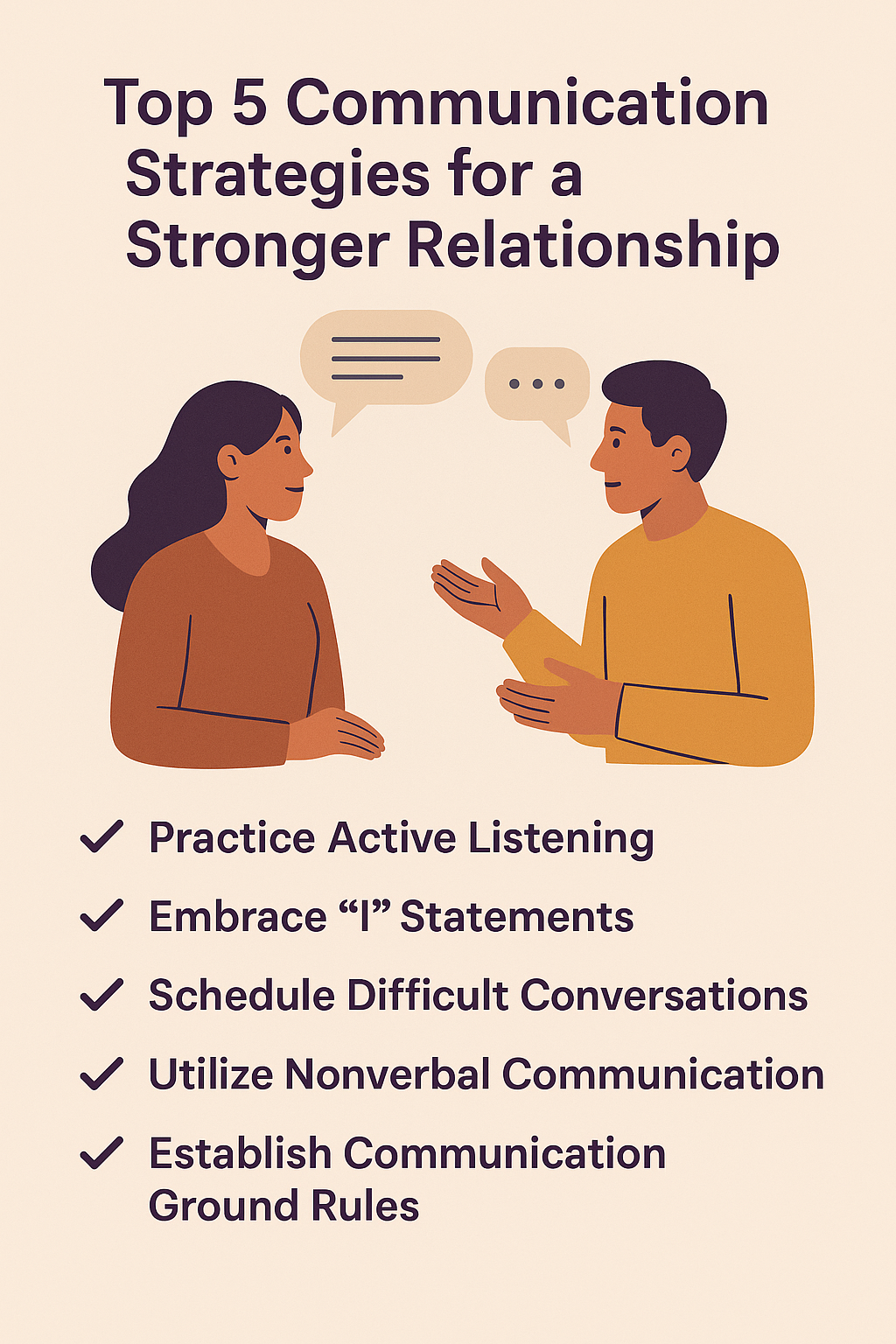The most crucial thing about any strong relationship is being able to talk to each other in a healthy way
How you talk to your spouse about your thoughts, feelings, and wants has a major effect on how close you are, how much you trust each other, and how happy you are in general, whether you’re dating, married, or in a long-term relationship. But research shows that one of the biggest reasons couples claim their relationships go bad or fail is because they can’t talk to each other. The Gottman Institute’s study suggests that couples who are honest and open with each other are 40% happier in their relationship than couples who don’t talk about their problems or let their anger build up.
This in-depth book, which is based on neuroscience, psychology, and real-life experience, tells you the Top 5 Ways to Talk to Each Other That Will Make Your Relationship Stronger. We’ll check out:
- Why it’s necessary to talk to each other
- Things that get in the way of couples
- Plans for every phase of techniques that have worked before
- Real-life examples and professional advice
- Common issues and how to solve them with questions that people regularly ask
- Conclusion and what to do next
- References to trustworthy sources for more information
Why communication is important
- It makes people feel safe and trusted.
People feel safe when they can discuss about things with other people. When partners talk about their flaws, it shows that they can be trusted and understood. This creates a “safe haven” where both people feel heard and cherished. - Stops the Confusion
People fight when they think they know what someone else is thinking. When couples use clear, detailed language, they can better understand each other. This also makes it less likely that people will get the wrong idea. - Gets people to know each other better
You can get to know each other better by talking about your hopes, anxieties, and the greatest aspects of your day. The Journal of Social and Personal Relationships suggests that being honest about who you are improves relationships. - Helps you find answers
When couples talk to each other properly, they can deal with problems in a healthy way instead of ignoring them or getting upset. - Helps Each Other Get Better
Couples and people improve when they get feedback, whether it’s good or unpleasant.
Things that make it hard to talk to each other
- Emotional Reactivity: When you’re stressed, being defensive ends the conversation.
- Avoidance: Ignoring difficulties to keep the peace only makes things worse.
- Negative Attribution: Thinking that someone is out to get you (“You’re always…”) makes disputes worse.
- Not paying attention: It’s tougher to genuinely get it when you interrupt or plan what you’re going to say.
- Phones and devices can break your focus and emotional connection.
You need to see these difficulties for what they are before you can go on. We’ll talk about each barrier below and provide you precise techniques to get around them.
Tip #1: Learn how to pay attention
What does it mean to pay close attention?
Being an active listener means more than just hearing what someone says. It involves being able to pick up on both verbal and nonverbal cues from your spouse so you can fully understand what they are saying. It has:
- Answers that show understanding: “That must have been a pain…”
- “Are you saying…”
- “Can you tell me more about…?”
How It Works
Researchers in neuroscience have revealed that when one partner pays attention, both partners release oxytocin, which is frequently termed the “bonding hormone.” This hormone helps you relax and be more understanding.
How to Do It
- Pick a quiet, private place.
- Set a time restriction for everyone, like 20 minutes, so they know their problems will be acknowledged and fixed.
Three Steps for the “LPC” Method
- Listen: Look at the individual, nod, and don’t talk over them.
- Paraphrase: Say what you heard: “It sounds like…”
- Check: Before you answer, ask yourself, “Did I get that right?”
- Body language is very important.
- Don’t cross your arms and lean in a bit.
- Use your voice to let them know you care and are interested.
- Have weekly “tune-in” meetings
Every day or week, talk about the good and terrible things for 15 minutes. Don’t try to solve problems when you listen actively.
A Real-Life Example
Maria and Daniel fought all the time over who should handle the chores around the house. Every week, Daniel rehearsed rewording Maria’s complaints by saying, “You felt overwhelmed by cleaning alone.” Maria thought they were paying attention to her, and they all worked together to develop a fair timetable for duties.
Tip #2: Use “I” Statements
What do sentences that start with “I” mean?
When you say “I,” you talk about how you feel and what you’ve been through without putting the blame on anyone else. For example:
“I get upset when plans change at the last minute because I wanted to see you.”
Why It Works
People get defensive when you blame them. When you express “I” statements about your feelings and needs, people are more likely to get what you’re saying than when you argue with them.
How to Put Structure into Action Your Declaration
I feel [emotion]
When [behavior/situation]
Because [what it does to you]
I would like [specific request]
- Don’t blame “you”
Instead of saying, “You always cancel plans,” try saying, “I feel let down when plans change without warning…” - Role-Playing Situations
Get together and practice, alternating roles so that everyone can see both sides of the statement. - Put It Down
Put your feelings down on paper. You can talk about your feelings by making them into “I” statements if they are powerful.
An example from real life
“I feel lonely when we don’t have dinner together because I value our evening talks,” Josh stated after working late. Can we set up three meals together this week? This strategy made their daily lives better and lessened their disputes.
Tip #3: Make plans for hard talks ahead of time. This is why timing matters.
Feelings can get in the way of logic. Scheduling makes sure that both partners are mentally ready and reduces down on surprise attacks.
How to Do It: Choose a Time
- Choose a time when neither of you is in a rush, say Saturday or Sunday morning.
- Make a plan for safety
Tell folks what you’re going to talk about ahead of time so they can think about it. - Take a “Low-Arousal Pause”
If your feelings get stronger than a 6 out of 10, agree to take a 10-minute pause before resuming. - Finish with a ceremony
To prove that you’re on the same team, end with an embrace, a walk, or something else that brings you together.
A real-life example
Sophie and Raj didn’t want to discuss about their money troubles. They were able to come with clear heads, set a budget, and agree on how to make the lecture more useful by writing it down for Saturday afternoon.
Tip #4: Use body language as a tool.
The Strength of Body Language
Nonverbal communication includes gestures, facial expressions, and tone of voice, which make up as much as 70% of all communication.
How to Use Mirror and Match
- Subtly emulate how they stand to build rapport.
Seeing Someone
- Eye contact: Keep it comfortable but not too much.
Understanding the Tone
- Speak in a calm, measured way rather than being loud or caustic.
Touching
- Putting your hand on someone’s arm, hugging them, or touching them softly might help halt a fight and make your relationship stronger.
A real-life example
Alex observed Maya’s shoulders go stiff as they were arguing. He stopped, held her hand softly, and murmured in a calm voice, “I see you’re upset; let’s take it easy.” When they conducted this small act of kindness, everyone calmed down right away.
Tip #5: Set rules on how to talk to each other as strategy #5. Rules make it easier to talk.
When there are clear standards, things are more fair and predictable, which discourages negative behaviors like stonewalling or showing disrespect.
How to Get Things Done: Set Your Own Rules
- For example, don’t call people names, let them talk without being interrupted, and don’t do more than one item at a time.
- Set Them Down
Make a list that you can see in your house or in your journal. - Say a “Safe Word”
Choose a word, like “Pause,” that tells you to stop or start over. - Check every three months
As your relationship changes, you should adjust the rules.
A Real-Life Example
Emma and Leo set out the guidelines on how to talk to each other on a whiteboard. They ordered everyone to “talk one at a time.” “Don’t interrupt” and “Use ‘I’ statements.” When Leo attempted to intervene during an argument, Emma softly reminded him of their rule. This gave back respect and focus.
Putting It All Together: A Plan of Action for 30 Days
| Week | Steps to Take | Focus |
|---|---|---|
| 1 | Active Listening: Every day, take 10 minutes to check in and rephrase one problem. | Active Listening |
| 2 | “I” Statements and Timing: Find three difficulties that keep coming up. For each one, write down a “I” statement and set up a time to talk. | “I” Statements & Timing |
| 3 | Nonverbal Signals and Rules—Be aware of how your body language affects you and modify it. Make rules on how to talk to each other and show them to each other. | Body Language & Rules |
| 4 | Putting things together and thinking about them: Talk about what went well and what didn’t. Change the plan of action. Do something fun together to celebrate the progress, like going on a date or going for a stroll. | Reflection & Celebration |
Frequently asked questions (FAQs)
- What can I do to quit fighting all the time?
People quarrel a lot when they don’t listen well or receive what they want. If you use “I” statements and active listening, you can convey what you need without blaming anyone. Schedule regular meetings to address about small issues before they get worse. - What if my partner doesn’t want to talk to me?
People that don’t talk to you can be afraid of getting into a fight or feel weak. You can ask them to talk to you about something that isn’t too important and tell them that you want to understand, not blame. Start by talking about topics that aren’t too serious, and then go on to subjects that are. - Is it easier to converse to each other when you text?
Texting is a terrific method to keep things in order, but it doesn’t have tone or nuance, which means that people are more likely to get what you say wrong. Talk about essential things on the phone or in a video call where you can see and hear each other. - How do I best say I’m sorry?
An apology that is real has:- Saying you’re sorry for something you’ve done (like “I’m sorry I yelled”)
- Responsibility (“That was rude”)
- “I’ll try to stay calm next time” is the apology.
- “Can you forgive me?” is a method to communicate you’re sorry.
- What if we become locked in a loop?
Say the “safe word” to stop. Then take a ten-minute pause to calm down and come back with the goal of comprehending instead than winning. - Should we get help from a pro?
If you and your partner are still having problems talking to each other, like with contempt, stonewalling, or distrust, couples therapy with a qualified expert can help you learn new skills and obtain honest advice. - How do we keep moving forward as time goes on?
Set up “relationship tune-ups” once a month to speak about what’s going well, make changes to the rules, and set new goals. Celebrate crucial events to help you sustain healthy behaviors. - How can I persuade people to trust me again after I’ve let them down?
In order to regain trust, you need to always be honest and dependable. Make sure to keep your promises, even the little ones, and check in on a regular basis. You can be trusted if you share your calendars or budgets and meet your promises.
Last Thoughts
Learning how to talk to each other well can help people get closer, work out their differences, and grow together. Couples can make their connection stronger by making rules, paying attention to body language, preparing crucial talks, and using “I” expressions. Remember that it takes time and effort to make progress. Check in on your communication strategies often and start with the 30-day action plan.
What to do next:
- This week, pick one strategy to use.
- Give this guidance to your partner and agree to work on it with them.
- As you continue, think about receiving aid from books, workshops, or licensed counselors.
References
- Gottman Institute. “The Magic Relationship Ratio.” Gottman.com. https://www.gottman.com/blog/the-magic-relationship-ratio/
- Hazan, C., & Shaver, P. (1987). “Romantic love conceptualized as an attachment process.” Journal of Personality and Social Psychology, 52(3), 511–524. https://doi.org/10.1037/0022-3514.52.3.511
- Laurenceau, J.-P., Barrett, L. F., & Pietromonaco, P. R. (1998). “Intimacy as an interpersonal process: The importance of self-disclosure, partner disclosure, and perceived partner responsiveness in interpersonal exchanges.” Journal of Personality and Social Psychology, 74(5), 1238–1251. https://doi.org/10.1037/0022-3514.74.5.1238
- Carter, C. S. (1998). “Neuroendocrine perspectives on social attachment and love.” Psychoneuroendocrinology, 23(8), 779–818. https://doi.org/10.1016/S0306-4530(98)00055-9
- Gottman, J., & Silver, N. (2015). The Seven Principles for Making Marriage Work. Harmony Books.
- Mehrabian, A. (1972). Nonverbal Communication. Aldine-Atherton.





































Asking questions are actually fastidious thing if you are not understanding anything completely, however this article provides nice understanding
yet.
Amazing! This blog looks exactly like my old one!
It’s on a totally different subject but it has pretty much
the same page layout and design. Wonderful choice of colors!
Hi there it’s me, I am also visiting this web page on a regular basis, this site is really fastidious and
the viewers are genuinely sharing good thoughts.
What’s up all, here every one is sharing such familiarity,
so it’s nice to read this weblog, and I used to pay a visit this
web site daily.
Wow, this article is nice, my sister is analyzing these kinds of things, therefore I am going to convey her.
Good answer back in return of this query with solid arguments and
telling the whole thing about that.
I really like what you guys are usually up too.
Such clever work and reporting! Keep up the terrific works guys I’ve
included you guys to my personal blogroll.
I constantly spent my half an hour to read this weblog’s articles or reviews all the time
along with a mug of coffee.
With havin so much written content do you ever run into any issues
of plagorism or copyright infringement? My website has a lot
of exclusive content I’ve either authored myself or outsourced
but it seems a lot of it is popping it up all over the internet without my agreement.
Do you know any techniques to help prevent content from being ripped off?
I’d truly appreciate it.
If you would like to get a good deal from this paragraph then you have to apply such methods to your won web site.